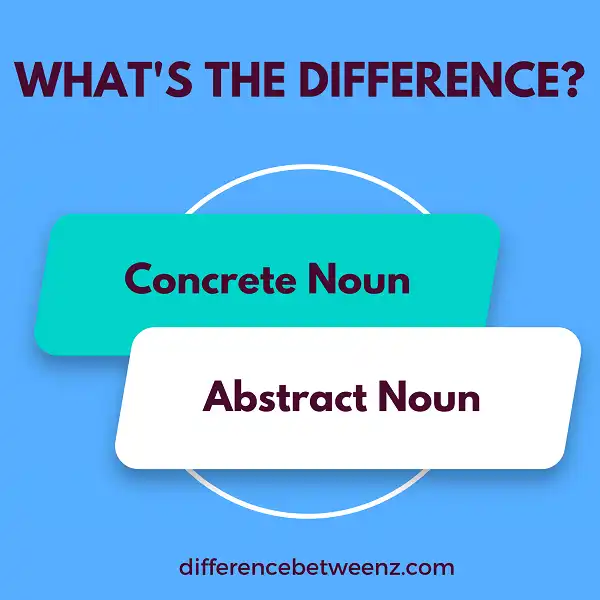A concrete noun is a physical object that can be seen and touched. An abstract noun, on the other hand, is an idea or concept that cannot be seen or touched. While concrete and abstract nouns may seem similar, there is a big distinction between them. Let’s take a closer look at the differences between these two types of nouns.
What is Concrete Noun?
Concrete nouns are those that can be experienced with the five senses. Concrete nouns can be touched, seen, smelled, tasted, or heard. Concrete nouns are the opposite of abstract nouns, which cannot be experienced with the five senses. Abstract nouns include concepts such as freedom, love, and anger. Most concrete nouns are physical objects. For example, “table,” “chair,” and “television” are all concrete nouns. However, some concrete nouns are not physical objects. For example, “sound” and “taste” are both concrete nouns. Concrete nouns are often used in descriptions because they help create a vivid image for the reader. In contrast, abstract nouns are more often used in generalizations because they cannot be experienced in the same way as concrete nouns.
What is Abstract Noun?
Abstract nouns are those which names things that cannot be perceived by the five senses. They are naming ideas, concepts, emotions, and states of being. Abstract nouns are usually created from verbs or adjectives, and they are often uncountable. For example, the word “love” is an abstract noun. It cannot be seen or touched, but it can be felt. Abstract nouns are often used in conjunction with concrete nouns. For example, “I have a lot of love for my family.” In this sentence, “love” is the abstract noun and “family” is the concrete noun. Abstract nouns can also be used on their own. For example, “I feel so much happiness.” In this sentence, “happiness” is the abstract noun. Abstract nouns are an important part of many languages, and they can be used to express a wide range of ideas and emotions.
Difference between Concrete and Abstract Nouns
Concrete nouns are physical objects that you can touch, see, smell, taste, or hear. Abstract nouns, on the other hand, are ideas, feelings, or concepts that cannot be experienced with the five senses. Concrete nouns are usually easy to identify because they refer to physical things that you can see and touch. Abstract nouns, however, can be a bit more elusive. They might refer to intangible concepts like love or justice. Or they might describe an emotion like happiness or sadness. The best way to determine whether a word is a concrete or abstract noun is to ask yourself if you can experience it with your five senses. If the answer is yes, then it’s a concrete noun. If the answer is no, then it’s an abstract noun.
Conclusion
In general, abstract nouns are more difficult to understand than concrete nouns. They are not as easily representable in the real world and they rely on the individual’s interpretation. Because of this, it is important to be aware of which words you are using when writing for a specific audience. Make sure that your words are clear and easy to understand by all readers by sticking with concrete nouns as much as possible.


